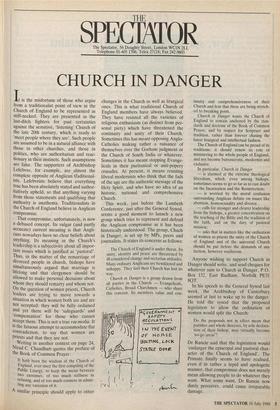The Spectator, 56 Doughty Street, London WC1N 2LL Telephone 01-405
1706; Telex 27124; Fax 242 0603
CHURCH IN DANGER
Iis the misfortune of those who argue from a traditionalist point of view in the Church of England to be represented as stiff-necked. They are presented as the last-ditch fighters for past certainties against the sensitive, 'listening' Church of the late 20th century, which is ready to `meet people where they are'. Such people are assumed to be in a natural alliance with those in other churches, and those in politics, who are authoritarian and reac- tionary in their instincts. Such assumptions are false. The supporters of Archbishop Lefebvre, for example, are. almost the complete opposite of Anglican traditional- ists. Lefebvrists believe that everything true has been absolutely stated and author- itatively upheld, so that anything varying from those statements and qualifying that authority is anathema. Traditionalists in the Church of England believe in Anglican Compromise.
That compromise, unfortunately, is now a debased concept. Its vulgar (and partly accurate) current meaning is that Angli- cans nowadays have no clear beliefs about anything. Its meaning in the Church's leadership is a subjectivity about all impor- tant issues which is justified as 'pastoral'. Thus, in the matter of the remarriage of divorced people in church, bishops have simultaneously argued that marriage is lifelong and that clergymen should be allowed to make personal decisions about whom they should remarry and whom not. On the question of women priests, Church leaders are trying to move towards a situation in which women both are and are not accepted: they will be fully ordained and yet there will be `safeguards' and `compensation' for those who cannot accept them. This is not a true via media. It is the fatuous attempt to accommodate flat contradiction, to say that women are priests and that they are not. Writing in another context on page 24, Nirad C. Chaudhuri quotes the preface of the Book of Common Prayer: It bath been the wisdom of the Church of England, ever since the first compiling of the Public Liturgy, to keep the mean between two extremes, of too much stiffness in refusing, and of too much easiness in admit- ting any variation of it.
A similar principle should apply to other changes in the Church as well as liturgical ones. This is what traditional Church of England members have always believed. They have resisted all the varieties of religious enthusiasm (as distinct from per- sonal piety) which have threatened the continuity and unity of their Church. Sometimes this has meant opposing Anglo- Catholics making rather a nuisance of themselves over the Gorham judgment or the Church of South India or whatever. Sometimes it has meant stopping Evange- licals in their puritanical or anti-popery crusades. At present, it means resisting liberal modernists who think that the fads of the age are the authentic message of the Holy Spirit, and who have no idea of an historic, national and comprehensive Church.
This week, just before the Lambeth Conference, just after the General Synod, seems a good moment to launch a new group which tries to represent and defend the Anglican compromise as it has been historically understood. The group, Chuch in Danger, is set up by MPs, peers and journalists. It states its concerns as follows:
The Church of England is under threat. Its unity, identity and peace are threatened by ill-considered change and sectarian attitudes. Many ordinary Anglicans are bewildered and unhappy. They feel their Church has lost its way.
Church in Danger is a group drawn from all parties in the Church — Evangelicals, Catholics, Broad Churchmen — who share this concern. Its members value and eon-
tinuity and comprehensiveness of their Church and fear that these are being stretch- ed to breaking point.
Church in Danger wants the Church of England to remain anchored by the stan- dards and doctrine of the Book of Common Prayer, and by respect for Scripture and tradition, rather than forever chasing the latest liturgical and intellectual fashion.
The Church of England can be proud of its traditions: it should renew its role of ministering to the whole people of England, and not become bureaucratic, modernist and exclusive.
In particular, Church in Danger
— is alarmed at the extreme theological liberalism, which, even among bishops, sometimes seems to go so far as to cast doubt on the Incarnation and the Resurrection; — is worried by the moral confusion surrounding Anglican debate on issues like abortion, homosexuality and divorce.
— calls for stronger and clearer leadership from the bishops, a greater concentration on the teaching of the Bible and the tradition of the faith, and on the duty of pastoral mission; — asks that in matters like the ordination of women as priests the unity of the Church of England and of the universal Church should be put before the demands of any faction, however vociferous.
Anyone wishing to support Church in Danger should write, and send cheques for whatever sum to Church in Danger, P.O. Box 132, East Rudham, Norfolk PE31 8QT.
In his speech to the General Synod last week, the Archbishop of Canterbury seemed at last to wake up to the danger. He told the synod that the proposed legislation to allow the ordination of women would split the Church: Do the proposals not in effect mean that parishes and whole dioceses, by sole declara- tion of their bishop, may virtually become 'no-go areas'?
Dr Runcie said that the legislation would 'endanger the .episcopal and pastoral char- acter of the Church of England'. The Primate finally seems to have realised, even if in rather a tepid and apologetic manner, that compromise does not merely mean allowing people to do whatever they want. What some want, Dr Runcie now dimly perceives, could cause irreparable damage.


















































 Previous page
Previous page